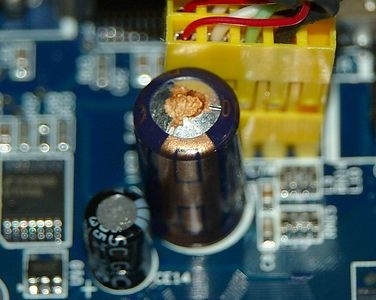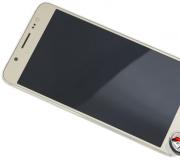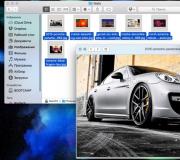If the laptop turns on and off very... Reasons for not turning on the laptop
If you encounter a similar problem, most likely the fault lies in hardware. Therefore, if a user who is wondering “the laptop turns on and immediately turns off, what should I do?” he must first figure out what caused the breakdown.
Main causes of malfunction
The most common factors why a gadget turns off immediately after turning it on are:
- Incorrect operation of the BIOS system software.
- Overheating of software components due to excessive dust contamination of the laptop.
- Overheating that occurs due to the lack of thermal paste or incorrect assembly of the cooling system.
- Damage hard drive in certain layers, or it is completely broken.
- The hard drive (file) structure was damaged.
- The fan responsible for cooling has stopped working.
- Does not work south bridge fees.
- The crystal has peeled off or split from the substrate.
- The PWM controller does not work.
- The power connector is damaged.
- Malfunction of the components of the power supply.
- There is mechanical damage to the USB port, causing the circuit to short out.
As you can see, there are many reasons why a laptop turns on and then immediately turns off again, and this is not the entire list. It is worth noting that only a specialist, the most best option- take the device to service center.
What can you do if your laptop turns on and then turns off immediately?
If you do not have the opportunity to contact a service center, let's look at what can be done to eliminate the unpleasant phenomenon.
We check the power supply and the battery.
First, turn off the power, and then completely remove the battery. Now you need to connect the power cord to the connector and connect it to the outlet. Next, we try to turn on the device. If it functions normally, then the problem lies in the battery. You can take it to a specialist, or simply buy a new battery.
We clean the system responsible for cooling.
Very often, the answer to the question why an HP, Asus, Acer, Lenovo, Toshiba laptop turns on and immediately turns off lies on the surface. It is possible that the system is simply dirty. Due to this, it overheats - dust prevents normal air circulation through the radiator. The video card, processor and other parts of the laptop are equipped with special sensors - they measure the temperature, and if it rises above the set point, they send a signal to turn off the laptop (protection against burnout).
You can simply avoid such phenomena - at least once a year, clean the cooling system from dirt, crumbs, dust and other contaminants. If the laptop’s warranty period has already expired, or you are completely confident in your abilities and know exactly how the gadget works, then you can clean it yourself.
We turn to specialists
Above we talked about the most common methods that can help get your computer working again, but first, as you can note, there are a lot of reasons why a laptop can turn on and off after a while. If all the actions taken earlier did not have any effect, the problem remains - in this case, you need to seek help from specialists.
They will conduct in-depth diagnostics (special equipment is used for this). Such a check can only be carried out by a professional, and only in a service center - otherwise, you may not only not fix the problem, but also add a new one. Specialists will be able to check everything step by step possible reasons device malfunction, and after the source of the problem is found, it will be eliminated. The price of the work will depend on the severity and complexity of the breakdown.
Tablet not working? Get it repaired at our service center low prices for spare parts, from our warehouse. Did your tablet fall and the screen crack? . We wrote an article about repairing iPads in our service center, read it.
Computers and laptops are considered sophisticated technology. Their owners often encounter a variety of glitches and problems. If you know how to act in a particular case, you can easily return the devices to functionality. Today we need to understand why a laptop turns on and off immediately. How can the situation be corrected?
Reasons for the phenomenon
The problem being studied can cause a lot of trouble. If the user is wondering why the laptop turns on and turns off immediately, you will have to prepare for the fact that there are a lot of options for the development of events.
Thus, among the most common reasons for device failure normal operation highlight:
- poor performance of the cooling system;
- Laptop cooler contamination;
- device overheating;
- Damage to the hard drive or sectors responsible for loading the OS;
- South bridge malfunction;
- violations file structure hard drive;
- split or damage to the microchip crystal on the northbridge substrate;
- lack of power supply to the laptop;
- low device battery charge;
- damage to the charging unit;
- presence of defects in USB ports that cause short circuits.
It follows that there are many reasons why a laptop turns on and off immediately. In addition to all of the above phenomena, one can also take into account the incompatibility of hardware. This option is relevant for cases of laptop upgrade.
First steps
Where to start diagnosing and correcting the situation being studied? First, it is recommended to pay attention to the power supply and battery.

Does your laptop turn on and off immediately? It is best to first turn off the device, then disconnect the battery from it and connect the laptop to the network via a special wire. You can try to turn on the device. If everything works fine, the problem lies in the device’s battery. It is recommended to either replace it with a new one, or stop using it altogether, or take the device to a repair shop for repair.
It is also recommended to check the integrity of the power wires. If the charger is damaged, the problem is most likely due to the battery not having enough charge. Repair charger will bring your laptop back to life.
Cooling system
Did all the above tips not help? Does your laptop turn on and then turn off immediately? What to do in this case?
The next diagnostic stage is checking the cooling system. You need to think about how long ago the laptop was cleaned from dirt and dust. For normal operation of the device, this must be done at least once a year.

If the laptop turns on and turns off immediately, the first thing you need to do is ensure good ventilation - place the device either on a special stand, or simply so that the cooler is in an open space. Try to turn on the device.
Nothing changed? In this case, it is preferable to take the laptop to a service center for cleaning. Usually, after this procedure, the laptop’s performance is restored. You can also clean the cooler yourself. This action is not recommended for inexperienced persons. Laptops require special care when cleaning.
Closures
In addition to all the suggested actions, each user can check the functionality of the USB ports themselves. As already mentioned, sometimes their damage leads to a short circuit. As a result, the laptop turns on and off immediately.
What exactly should I do? You just need to carefully examine the integrity of all available ports on the laptop panels. If any displacements, chips or other damage are noticeable, then the reason the laptop turns off is precisely a short circuit.
Unfortunately, not everyone can fix a problem on their own. Replacing or repairing USB ports can be done without much difficulty at service centers. Accordingly, this is where you will need to turn.

In-depth diagnostics
Does your laptop turn on and off immediately? When you turn it on, you hear the sound of the cooler operating, but all the proposed methods of action did not produce results? Most likely, the problem with this behavior is the failure of the laptop. As already noted, a huge number of components can cause problems with the laptop.
In-depth diagnostics are carried out exclusively in service centers. Only extremely experienced PC users can independently understand why the laptop turns off. Therefore, you just need to take the device to any service center, describe the problem and wait. The technician will conduct a complete diagnosis of the laptop as soon as possible, and then correct the situation. If the laptop is simply worn out, you will have to buy a new one.
Results
Now it’s clear why the laptop turns on and off immediately. This failure You can often fix it yourself. You just need to clean the device and its cooler, charge the battery and check the integrity of the wires for connecting to the network.

Problems are always easier to prevent than to fix directly. To reduce the likelihood of a problem being studied to a minimum, you need to:
- Clean your laptop cooler every few months;
- take care of the integrity of the battery and power cables;
- work carefully with USB devices;
- Don't upgrade your laptop yourself.
Basically, that's all. If you have no desire to understand the reasons why the laptop turns off when you turn it on, it is best to take the device to a service center. This is the most effective solution. It is a 100% guarantee of a successful fight against laptop shutdown.
Unfortunately, this event is not that rare. And it is not always safe for operating system. But don’t panic right away. Among other things, it would be nice to also know what to do when you turn off your laptop. Usually, each case has its own specific algorithm of actions.
System failure
The first reason why a laptop turns on and off immediately is the most common system failure. In the operating system, of course. In this case, there are several ways to correct the situation.
Firstly, you can repeat the activation several times. Maybe the error will go away on its own. But you shouldn't hope for it too much.
Secondly, reinstalling the operating system can also correct the situation. All actions will have to be done very quickly. But this is not the best option.
Thirdly, you can use installation disk with Windows perform a system rollback. Sometimes it helps too. In principle, it is better to try all the tips. Something will help in case of a system failure.
Power
The following scenario is relevant when the battery on the device is not used. In this case, the laptop turns on and off immediately due to lack of network power. This is also a fairly common case. Fortunately, it does not pose any significant danger, and it can be easily corrected.

All that is required from the user is to connect the laptop to another outlet. The one with the most tension. After all, it is the lack of the required charge that causes this problem. So you don’t always need to immediately panic and change your laptop.
Battery charge
Just like last time, there is nothing dangerous here. And it's easy to fix the situation. It is enough to connect the laptop to the network with a wire without removing the battery. Charge your device. Now all problems and failures will disappear.
It often happens that the laptop turns on and turns off immediately if the battery is installed incorrectly. You need to check the position of this component first. If there are any deviations, you must pull out the part and install it in the correct position.
Breakdowns
Something else? Of course, there are more than enough reasons for this problem. The next point that users usually overlook is the condition of the equipment. Why does my laptop turn on and then turn off immediately? The reason for this may be a banal breakdown of any component. For example, network cable or the battery itself.

What to do? First, detect the breakdown. How exactly to do this, decide for yourself. You can carry out diagnostics yourself or take the device to a service center. The second stage of dealing with breakdowns is their repair. Or complete replacement of failed parts. The second option is more common. After all, users believe that an absolute replacement provides some kind of guarantee for the operation of the device.
You should not attempt to repair any components in your laptop yourself. This can render the device completely inoperable. Therefore, the service center will help here. Or you can contact anyone system administrator for help. Repairing and changing some components of a laptop yourself is only permissible if you have previously had such practice.
Viruses
Next, a little about errors and failures of the operating system. They, as already mentioned, can cause the laptop to turn off and immediately turn off. However, there is a more dangerous situation, indirectly related to the first cause of this phenomenon. We are talking about the presence of viruses on the computer.
Some kind of “infection” simply damages important system components. For example, "BIOS". And this damage prevents the system from starting. It just keeps rebooting, over and over again. Or it turns off completely. This is perhaps the most dangerous thing that can happen to a computer.

In most cases, if a virus has “brought” the system to such behavior, you need to urgently contact a service center for help. It is unlikely that you will be able to correct the situation on your own. The technicians will try to bring the laptop back to life. If viruses have not damaged important system components too much, then the situation can be corrected.
According to some users, there is no need to hope for success here. It’s not without reason that the laptop turns on and off immediately. When turned on, the BIOS is loaded. Without it, not a single computer will work. And some viruses can not only damage, but also completely destroy this component without the possibility of its restoration. So, viruses are a completely serious and justified reason for panic.
Overheat
True, there is something else. It is not always necessary to throw away the laptop when the problem mentioned above occurs. Does the fan turn on and then turn off immediately? Here, before making any colossal conclusions, the first thing you must exclude is one small point that is usually not taken into account. We are talking about overheating of the computer. It is because of this that it can turn on and off right there. Sometimes this happens after a few minutes of working with the operating system.

Find out why your computer is overheating. Most likely, the fan in it is simply already dusty. Usually, when you turn off your laptop yourself, cleaning it helps. Once the cooler is clean, no reboots or shutdowns will bother you. To eliminate the possibility of overheating, you should clean the fan in your laptop regularly. At least once every 6 months. As you can see, there are more than enough reasons for the laptop to turn on and off immediately. It is usually difficult to predict and diagnose a specific case without the help of professionals. Therefore, it is better to immediately take your device to a service center.
Before solving the problem, you need to understand reasons occurrence of this problem. First of all, systemic problems caused by virus, since it only affects operation after the OS is fully loaded. pay attention to external factors that influence " iron» mechanically. The range of such problems is extensive, so it is necessary to consider each case separately.
Causes and troubleshooting methods
There are many reasons why your computer turns on and off immediately. Some of them are resolved quite simply, others require outside intervention with subsequent replacement certain elements. The reasons given below are written in ascending order, starting with minor problems and ending with the failure of individual parts.
Contamination of the system unit and overheating of components
Dust is an excellent conductor of current. If there are enough dirt particles, it may occur first overheat, and then short circuit. Most often, the power supply becomes faulty, since it is separately closed from the rest motherboard. Recommended systematically clean system unit computer (once every 3 months), as well as power unit(once every 6 months).
IN summer time(July, August) it is necessary to increase the frequency of “general cleaning”, since in addition to dust, fluff particles get into the system unit.
Checking RAM
Theoretically, it is possible to run a PC without RAM, but for a short time. Failure of RAM (random access memory) is one of the most common problems when the computer does not start. Try leaving only one stick of RAM, and then repeat the action with other memory blocks. If PC won't turn on, then most likely all the RAM sticks have failed. Working memory will help you check your guess. It is impossible to restore broken ones, so this will solve the problem complete replacement memory sticks. 
Checking the capacitors
If the previous methods did not help, then inspect motherboard and power supply. Pay attention to the capacitors. The working board and power supply do not have mechanical damage
. Exploded or swollen capacitors in most cases are the cause of board inoperability, and, consequently, a breakdown due to which the PC does not work. If you find similar defects, then the board must be replaced. 
Failure of computer components
Problems inside the motherboard occur due to overheating components, which leads to poor computer performance. The following are at risk: details:
- CPU– overheating due to contamination or low fan power;
- Video card– poor cooling system when using high powers;
- HDD– overheating. To fix this problem, you need an additional fan;
- power unit– accumulation of dust leading to short-circuiting of the element.
To prevent such problems it is necessary modernize cooling system or just clean your computer.
Hardware problems - BIOS reset
Voltage fluctuations are a common occurrence in post-Soviet countries. When the current supply is unstable hardware The PC may turn on the internal fuse and not start the computer. In order to return the system to the initial state necessary reset BIOS settings, but due to the constant shutdown, this is impossible to do. There are two options for solving this problem.
Some laptop owners may encounter a problem when the laptop screen does not turn on, and the laptop itself turns off before it can turn on. What to do in this case, and what is the root cause?
First of all, it is worth determining whether it is a system or hardware problem, specifically whether the laptop itself does not turn on or the software does not start. Often, the phrases “the laptop monitor does not turn on” and “the laptop turns off immediately after being turned on” have the following meaning: the lights do not start blinking, confirming the functionality of the drive or hard drive, or the cooler does not start. In other words, nothing happens when you press the power button.
Reasons why the laptop screen does not turn on
There are several reasons for this “behavior”; let’s look at the most common ones.Why does my laptop turn on and then turn off immediately?
- Carefully inspect the power connector - perhaps it has broken and the contact has fallen off. Also inspect the cord and plug. Check to see if the wire is broken or pinched.
- The external power supply is faulty, and the laptop battery itself is discharged.
- One bridge of the motherboard has failed or the central processor has been damaged.
- One of the problems that the laptop turns on and off immediately may be incorrect BIOS firmware, or the chip itself is damaged
- The reason that the laptop monitor does not want to turn on may also be a short circuit in the motherboard.
There may be other reasons for the fact that the laptop turns on and then turns off immediately after - lack of initialization. That is, the operating system does not load, which may also be accompanied by special sound signal or its absence.
The reasons for turning off the laptop are:
A dusty cooler and severe overheating cause the north/south bridge of the motherboard to burn out or become unsoldered.
RAM malfunction.
The EPROM chip is faulty or the BIOS firmware is damaged.
To prevent these problems from occurring:
Handle the laptop, cord and power supply with care. By excluding external factors of damage, you will protect your equipment from breakdown.
Check regularly for viruses. Some especially harmful viruses may damage RAM and other internal parts of the laptop. It is recommended not to download or install suspicious files on your laptop.
Clean both the interior and exterior of your laptop regularly.



